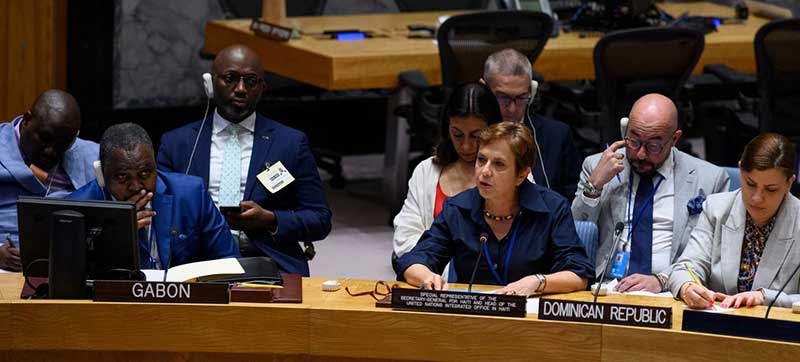Guterres appeals for humanitarian, security and political action to end Haiti’s ‘living nightmare’

New York: The world must act now to stem the violence and instability in Haiti, UN Secretary-General António Guterres said on Thursday, appealing for simultaneous action on the humanitarian, security, and political fronts.
He said citizens of the Caribbean nation are “trapped in a living nightmare” as armed gangs encircle the capital, Port-au-Prince, blocking roads, controlling access to food and healthcare, and undermining humanitarian support.
Mr. Guterres was speaking at UN Headquarters fresh from a visit to the country and a summit of regional leaders, held in Trinidad and Tobago, during which he participated in a special session on Haiti.
Terrorizing local communities
He told reporters that predatory gangs there are using kidnappings and sexual violence as weapons to terrorize entire communities.
“I have heard appalling accounts of women and girls being gang-raped and of people being burned alive,” he said.
Tweet URL
During his one-day visit to Haiti on Saturday, Mr. Guterres met with Prime Minister Ariel Henry and representatives from many sectors of society, acknowledging signs of hope and possibility.
Fund humanitarian 'lifeline'
“But, it requires action on several fronts and a recognition of a core truth,” he said.
“There can be no sustainable security without a political solution that allows for the restoration of democratic institutions. And there can be no lasting and inclusive political solutions without a drastic improvement in the security situation.”
Mr. Guterres urged the international community to take action in what he called three essential areas, starting with addressing the urgent humanitarian needs in the country. A $720 million plan to support more than three million people there is currently only 23 per cent funded.
“I appeal to the world to extend a lifeline of support and fill that financial gap without delay,” he said.
Deploy multinational force
The Secretary-General also appealed to the UN Security Council “and all relevant potential contributing countries” to create the conditions for allowing the deployment of a multinational force to assist the Haitian National Police, which the Government had requested back in October.
“I repeat: We are not calling for a military or political mission of the United Nations,” he said. “We are calling for a robust security force deployed by Member States to work hand-in-hand with the Haitian National Police to defeat and dismantle the gangs and restore security across the country.”
He added that the police force will also need financing, training, and equipment, which are all critical to restoring State authority and delivery of vital services.
Step up political efforts
Mr. Guterres also appealed for all social and political actors in Haiti to step up efforts toward a desperately needed political solution. He expressed full support for mediation efforts by the regional bloc, CARICOM.
“Taken together, these three vital and simultaneous steps are fundamental to breaking Haiti’s cycle of suffering by addressing dramatic humanitarian and security challenges and forging a political pathway out of the crisis,” he said.
Support for international force
Later in the day, the head of the UN Integrated Office in Haiti (BINUH), urged the UN Security Council to continue to support its vital work amid the myriad challenges gripping the country.
Special Representative María Isabel Salvador updated ambassadors on progress in the implementation of an agreement on inclusive transition and transparent elections, signed in December by the Prime Minister, several political parties, civil society, and the private sector.
She noted that there is widespread backing for the deployment of an international force to assist the Haitian National Police.
Ms. Salvador said that while the political transition and the fight against gangs should remain on separate tracks, they are inextricably linked.
“Improved security and continuous political dialogue would bring about the possibility to hold elections, a critical step on the path to reestablishing democratic institutions and elected officials at all levels of government,” she said.
Vigilante groups, rising displacement
Addressing the dire security situation, she noted that the violence continues and has intensified, moving beyond the capital.
“The appearance of vigilante groups adds another layer of complexity," she added. "Since April, BINUH has documented the killing of at least 264 alleged gang members by vigilante groups."
Ms. Salvador said insecurity also has a detrimental impact on economic and social rights, as access to education, food, water, sanitation, and healthcare services has been severely limited.
The increase in violence in the Port-au-Prince metropolitan area has also displaced nearly 128,000 people from their homes, sparking a rise in migration.
‘Grim’ humanitarian outlook
Meanwhile, the humanitarian situation in Haiti is “increasingly grim and likely to deteriorate even further”, she said. Some 5.2 million people, including nearly three million children, require urgent support and protection.
Haiti has one of the highest levels of food insecurity in the world, with some 4.9 million people affected, and the healthcare system is on the verge of collapse.
The country also remains highly vulnerable to climate change and natural disasters. Deadly floods, followed by an earthquake, killed 58 people last month and impacted 45,000 households.
Solidarity and action
As BINUH’s mandate is set to expire mid-month, Ms. Salvador made the case for its renewal.
“I ask for your support in ensuring that BINUH is adequately resourced to effectively and efficiently deliver its mandate and help Haiti out of these crises while ensuring the safety and security of UN personnel,” she said.
“This is a critical moment, which we cannot afford to waste. This is a time for international solidarity and immediate action.”



